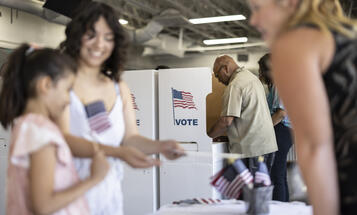
Loving v. Virginia—50 Years Later We Still Must Fight for Racial Justice
Today is the 50th anniversary of the Supreme Court’s decision in Loving v. Virginia, holding that state miscegenation laws were unconstitutional. These laws arose “as an incident to slavery,” and prohibited interracial marriage based on theories and systems of white supremacy. In the lower court decision, the trial court judge had ruled that “Almighty God created the races white, black, yellow, malay and red, and he placed them on separate continents. And, but for the interference with his arrangement, there would be no cause for such marriage. The fact that he separated the races shows that he did not intend for the races to mix.”
Thanks to the bravery of Richard and Mildred Loving, on June 12, 1967, the Supreme Court overturned that ruling, and held that laws prohibiting interracial marriage violated the Equal Protection and Due Process protections of the Fourteenth Amendment. Chief Justice Earl Warren’s opinion was the first that ever used the term “white supremacy,” and it means that families like mine can legally exist. In fact, recent studies show that over 20 percent of new marriages in the United States are now interracial marriages. But we still have a very long way to go to achieve equal protection under the law.
Every day since the election of a white supremacist president, I’ve heard of hate speech, hate crimes, nooses in DC, racist language in my son’s elementary school, and Attorney General Jeff Beauregard Sessions rescinding policies against racial profiling by police, despite the over-policing and killing of African Americans. Parents in mixed-race families see the faces of black children killed by police and know that white supremacy continues, as we worry about our own children’s safety.
The Lovings would be happy to know that over 26 percent of U.S. children have an immigrant parent, and many are in mixed-race families; but they would be sad to know Trump’s mass deportation policies are criminalizing these children and tearing apart their families. President Trump’s talk against “bad hombres” has been implemented through threatening sanctuary cities and criminalizing all immigrants, the great majority of whom are people of color. Mixed-race Latino families are afraid for children of color, communities of color, and the men and women of color in our families. We also know the attack on immigrants is another way to decrease access to citizenship for black, Latino, and Asian American families. This generation does not have the same path to citizenship as prior, majority-European generations of immigrants. Fundamentally, the Trump administration is against race-mixing in the form of equal access to citizenship, safety and belonging.
There is hope. New data about mixed-race families shows the potential power of changing demographics. Professor Sherryl Cashin has collected studies showing that interracial marriage and friendship lead to higher levels of dexterity in understanding the experience of people of color. These relationships also lead to support for the policies needed to end systemic racism. Moreover, many believe that the protests against Trump have led to higher consciousness that intersectional approaches to democracy, centered around racial justice, are needed to overcome all forms of injustice.
In interracial families, we are deeply grateful for the bravery of the Lovings, which enabled us to legally exist, but at the same time, we are still feeling the impact of institutional racism every day. Let’s be honest: it’s obviously still a matter of white supremacy. Light-skinned people are not harassed by the police or rounded up by ICE, while our brown-skinned family members and friends are living in a different, much more dangerous reality. We protect each other more in interracial communities, and hold our children closer these days.
The time has come for politicians to realize that if they want our support, they need to stand up to institutionalized racism and commit to real change. That includes economic and social justice issues, of course, but it must also include commitments to end racial profiling, mass incarceration, police violence, and deportations, and to provide equal access to education and the fundamental right to vote. It also includes equalizing democracy by supporting candidates from grassroots communities of color, and the leadership of the next generation. We owe it to the Lovings to ensure that their dream is fully realized, by using the opportunity that interracial relationships bring to educate against white supremacy, empower people of color, and fight for racial justice and inclusive democracy together.


